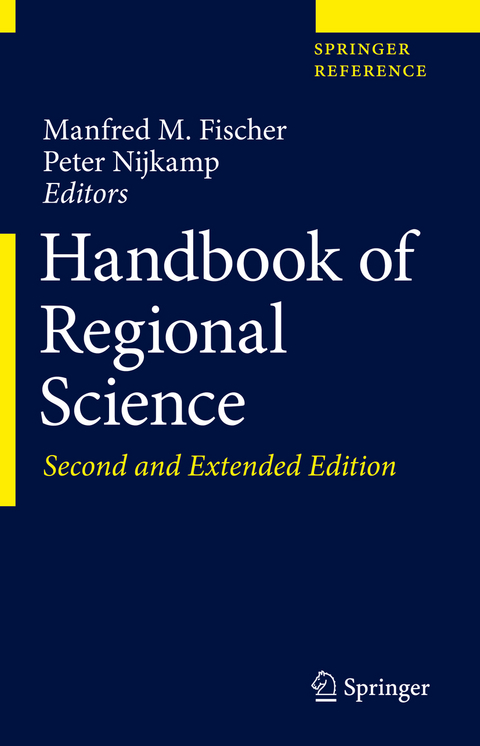
Handbook of Regional Science
Springer Berlin
978-3-662-60722-0 (ISBN)
The Handbook of Regional Science is a multi-volume reference work providing state-of-the-art information, prepared by respected scientists in the field. This second edition includes new sections on the history of regional science, and on regional policy. It has been thoroughly updated to reflect new developments, including new chapters on R&D collaboration networks, knowledge spillovers, web-based tools for exploratory spatial data analysis, fuzzy modeling, multivariate spatial process models, heterogeneous coefficient spatial regression panel models, and endogeneity in spatial models, among others.
The multi-volume handbook covers the field of regional science comprehensively, including topics such as location and interaction, regional housing and labor markets, regional economic growth, innovation and regional economic development, regional policy in emerging markets, new economic geography and evolutionary economic geography, environmental and natural resources, spatial analysis and geocomputation, as well as spatial statistics and spatial econometrics. The book is intended to serve the needs of graduate students, beginning and experienced scientists in regional science and related fields with an interest in exploring local and regional socio-economic issues.
Manfred M. Fischer is an Emeritus Professor of Economic Geography at the Vienna University of Economics and Business, and an Adjunct Professor at the Chinese Academy of Sciences. He was co-founder of the prominent interdisciplinary journal Geographical Systems (Gordon & Breach) and is now editor-in-chief of its successor, the Journal of Geographical Systems (Springer). He also co-founded the Springer book series Advances in Spatial Science, and served as Chair of the IGU Commission on Mathematical Models for eight years. In this role he was responsible for organizing several of the Commission's highly successful international meetings around the world, including symposia in Shanghai and Beijing (1990). For more than forty years he has consistently made significant contributions to regional science in general, and spatial data analysis, geocomputation and spatial econometrics in particular. He has published widely, both books and articles in dozens of academic journals. His monograph on Metropolitan Innovation Systems has been translated into Chinese (Shanghai People's Publishing House, 2006). In recognition of his scholarly achievements, he has been named a fellow of the Regional Science Association International, the Royal Dutch Academy of Sciences, the Austrian Academy of Sciences, and the International Academy of Sciences for Europe and Asia. Moreover, he has received the highest accolades from the RSAI: the Jean Paelinck Award for outstanding scholarly achievements in the field of Regional Science Methods (2015), and the Founder's Medal, which is awarded every four years for significant life time contributions (2016). Peter Nijkamp is an Emeritus Professor of Regional and Urban Economics and Economic Geography at the VU University, and is affiliated with the Jheronimus Academy of Data Science (JADS), 's-Hertogenbosch (the Netherlands), the Royal Institute of Technology (KTH), Stockholm (Sweden) and A. Mickiewicz University, Poznan (Poland). He serves on the editorial/advisory boards of more than 30 journals. According to the RePec list he is one of the top 30 most well known economists in the world. His main research interests cover quantitative plan evaluation, regional and urban modelling, multicriteria analysis, transport systems analysis, mathematical systems modelling, technological innovation, entrepreneurship, environmental and resource management, and sustainable development. In the past years he has focussed his research in particular on new quantitative methods for policy analysis, as well as on spatial-behavioural analysis of economic agents. He has a broad expertise in the area of public policy, services planning, infrastructure management and environmental protection. In all these fields he has published many books and numerous articles. He is member of editorial/advisory boards of more than 30 journals. He has been visiting professor in many universities all over the world. According to the RePec list he belongs to the top-30 of well-known economists world-wide. He is past president of the European Regional Science Association and of the Regional Science Association International. He is also fellow of the Royal Netherlands Academy of Sciences, and past vice-president of this organization. From 2002 - 2009 he has served as president of the governing board of the Netherlands Research Council (NWO). In addition, he is past president of the European Heads of Research Councils (EUROHORCs). He is also fellow of the Academia Europaea, and member of many international scientific organizations. He has acted regularly as advisor to (inter)national bodies and (local and national) governments. In 1996, he was awarded the most prestigious scientific prize in the Netherlands, the Spinoza award.
1 Theory and History of Regional Science.- 2 Location and Interaction.- 3 Regional Housing and Labor Markets.- 4 Regional Economic Growth.- 5 Innovation and Regional Economic Development.- 6 Regional Policy in Emerging Markets.- 7 New Economic Geography and Evolutionary Economic Geography.- 8 Environmental and Natural Resources.- 9 Spatial Analysis and Geocomputation.- 10 Spatial Statistics.- 11 Spatial Econometrics.
| Erscheint lt. Verlag | 14.1.2021 |
|---|---|
| Reihe/Serie | Handbook of Regional Science |
| Zusatzinfo | XLVIII, 2318 p. 238 illus., 98 illus. in color. In 3 volumes, not available separately. |
| Verlagsort | Berlin |
| Sprache | englisch |
| Maße | 155 x 235 mm |
| Gewicht | 4902 g |
| Themenwelt | Wirtschaft ► Volkswirtschaftslehre ► Wirtschaftspolitik |
| Schlagworte | Environmental and Natural Resources • Evolutionary economic geography • Innovation and Regional Economic Development • Location Theory • New Economic Geography • Regional Economic Growth • Regional Housing and Labor Markets • Regional Policy in Emerging Markets • Spatial Analysis and Geocomputation • Spatial econometrics • spatial statistics • Theory and History of Regional Science |
| ISBN-10 | 3-662-60722-0 / 3662607220 |
| ISBN-13 | 978-3-662-60722-0 / 9783662607220 |
| Zustand | Neuware |
| Haben Sie eine Frage zum Produkt? |